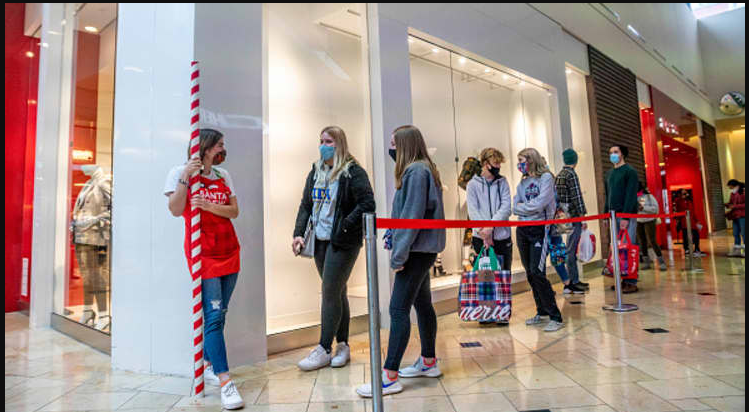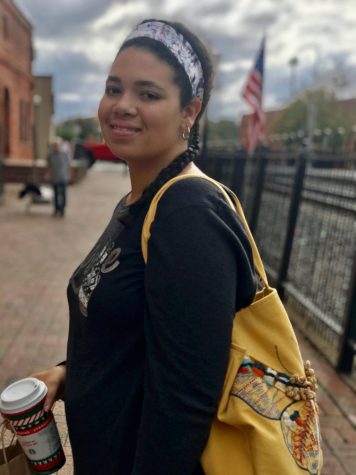Black Friday 2020 vs the 2000s
Courtesy of CNBC From social distancing to mask-wearing, Black Friday looked to entail a bizarre version of the busiest shopping day of the year. As online shopping dominates the market this year with staggering numbers, violent brawls remain a memory keeping customers both safe and healthy. The question now–what will 2021 mean for Black Friday? And how will the economy recover amidst a deadly pandemic?
December 9, 2020
As COVID-19 cases climb to a staggering 11.6 million cases worldwide and over 250k deaths across the U.S, the traditional holiday season becomes a hassle with states such as New York limiting gatherings and instituting new restrictions. With new CDC guidelines underway Thanksgiving, Christmas and especially Black Friday look different this year with mandatory social distancing and masks. Instead of packed crowds and fights over low-priced goods, the U.S. will resort to alternative methods such as online or contactless shopping to help prevent further spread.
“I feel like a lot of stores have extended Black Friday stores dates so they can get their money’s worth while amidst a pandemic,” Sophomore Victoria Sorell said.
Looking at the early 2000s, Black Friday soon became a beloved tradition amongst Americans with millions going as far as spending the night outside of stores to catch a decent discount. This happened as a result of chain stores such as Macy’s, Target who began the tradition of opening as early as 6:30 am until 2011 when midnight became a regular time for holiday shopping. As years went on Black Friday accounted for millions of American’s holiday shopping needs.
In addition to Black Friday’s popularity in stores, online shopping slowly became a trend with millions using popular sites such as Amazon to get their holiday shopping done. Looking at 2020, with COVID-19 preventing standard in-store purchasing, over 80% of online transactions across the top 100 U.S. web retailers, consumers spent $9 billion on Friday making for a 21.6 percent increase over Black Friday in 2019.
This trend however is not the first instance of online shopping mania according to the National Retail Foundation, in 2018 over 89 million people shopped online and in stores on Black Friday, a 40% increase from 64 million in 2017. In addition, Black Friday 2018 accounted for 7.1% of the money consumers spent during that holiday season from Thanksgiving Day to Christmas. The top Black Friday 2018 retailers included Walmart, Amazon, and Target.
“Online shopping has become a priority because many need essential things but cannot go out and get them due to the pandemic or they don’t feel comfortable doing so. If they don’t feel comfortable doing so it’s nice to have the online shopping option,” sophomore Victoria Sorell said.
Another factor of the Black Friday experience, comes with the adrenaline racing through bystanders and anxious consumers, encouraging them to find the best deals. This anxiety, however, quickly escalates the eager crowd. In 2011, a Walmart in North Carolina witnessed the injury of 11 bystanders as an off duty cop began spraying pepper spray across an uncontrollable crowd. Georgia specifically faced this problem in 2018 when a shopper wanted to check out an “attractive woman.” Outside the mall, he got knocked out and shot by the woman’s beau. An overexcited spectator then pulled out his own gun and began shooting.
Although problems still exist amidst a pandemic, the lack of in-store shopping, as well as social distancing restrictions, helps prevent violent encounters. Furthermore, with early shopping, 42% of consumers started their holiday shopping earlier than usual this year, according to a survey from the National Retail Federation. Several retailers allowed shopping on Sunday offering deals up till Cyber Monday.
As 2020 comes to an end, consumers continue to cope with the climatic events concerning Covid as well as continuing to provide for their loved ones in desperate times. From Black Friday brawls to a record-breaking surge in online shopping, Black Friday continues to remain a holiday tradition regardless of current conditions. Until the distribution of various COVID-19 vaccines occurs, Black Friday will remain an event of limited contact as the world returns to newfound stability.







